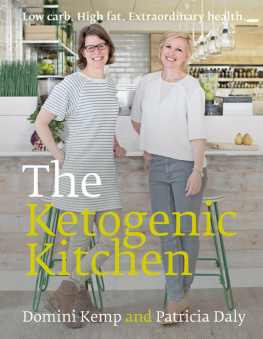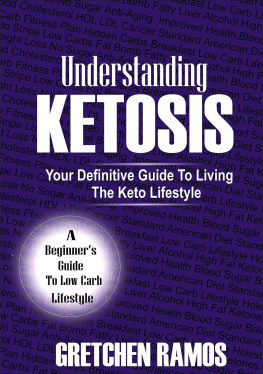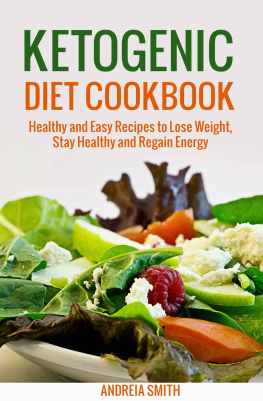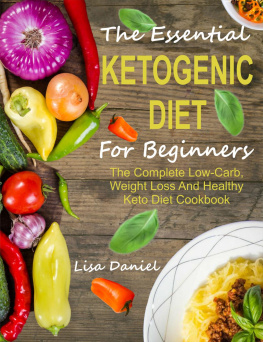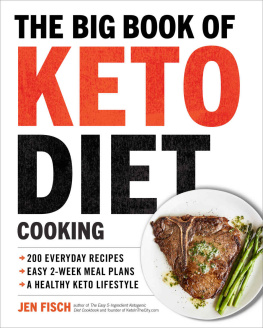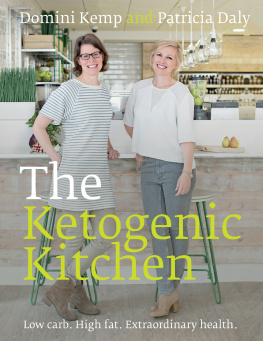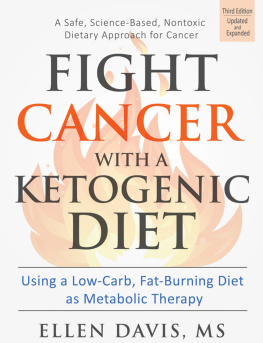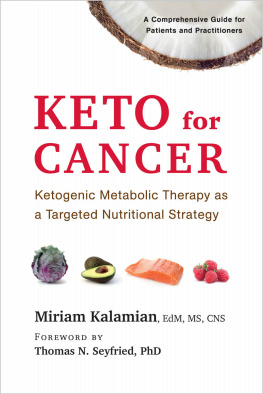The
Ketogenic
Kitchen Low carb. High fat. Extraordinary Health. Domini Kemp and Patricia Daly
Gill Books Information given in this book is not intended to be taken as a replacement for medical advice. Any person with a condition requiring medical attention should consult a qualified medical practitioner or therapist.
Acknowledgements We would like to thank everyone in Gill Books who put so much hard work into making this book happen, especially Nicki Howard, Catherine Gough and Teresa Daly, and the inside-outsiders Graham Thew and Kristin Jensen.
We also owe a huge debt to photographer Joanne Murphy and stylist Orla Neligan, who did an amazing job. Thank you for making it all look so gorgeous. Huge thanks to Gillian Fallon for her endless talents, from chopping and cooking to writing and editing. Gillian was the first person to really put some shape on all the writing and we are extremely grateful for her brilliant editing skills. Thanks also to Melissa Turner for her nutritional analysis. We also want to thank all the doctors, nurses and scientists that help people overcome this disease every day.
We are both alive because of the excellent care that we received. Now its our turn to try to give something back. A huge amount of support and encouragement as well as excellent opinions in this book came from Professor Adrienne Scheck, Dr Colin Champ, Dr Mark Atkinson, Dr Georgia Ede and Susan Wood. We thank them sincerely for making the time to read the book, make suggestions and to contribute to the book. We cannot thank you enough. Thanks also to many dear colleagues and friends, especially Alessandro Ferretti (www.chhp.com), Emily Maguire (www.lowcarbgenesis.com), Lily Nichols (www.realfoodforGD.com), Maev Creaven (www.nutritioncentre.ie) and Ivor Cummins (www.thefatemperor.com) for their continuous support, encouragement and sharing of knowledge.
And finally, special thanks to our families and friends. Throughout our treatment you were always there for us, and for that we are eternally grateful. Without you, there would have been no book. Thank you. Domini Kemp and Patricia Daly, 2016
www.theketogenickitchen.com Expert opinions PUBLIC INTEREST IN ketogenic diets for the treatment of cancer and other challenging health conditions is growing rapidly much faster, in fact, than the availability of high-quality resources people can use to apply these valuable dietary principles to their daily lives. That is precisely what makes The Ketogenic Kitchen such a timely treasure.
I follow a ketogenic diet myself, so I can tell you firsthand that it is safe, comfortable and effective. While it can be challenging to learn and adjust to at first, the benefits are well worth it. As a psychiatrist with a special interest in nutrition and metabolism who studies, writes about and prescribes ketogenic diets, I can tell you that they have uniquely powerful healing properties for the brain. Ketogenic diets have been used to treat a variety of complex neurological and psychiatric conditions, from epilepsy to Parkinsons disease to Alzheimers dementia. There is even emerging evidence that people with bipolar disorder and other mood disorders may benefit from a ketogenic diet. These specially formulated low-carbohydrate, adequate-protein, high-fat diets rescue us from the invisible rollercoaster of blood sugar, insulin and stress hormones that most people ride all day long without even realising it.
This dangerous pattern destabilises brain chemistry, causing spikes and crashes in energy, mood and concentration throughout the day. This is why I recommend low-carbohydrate/high-fat and ketogenic diets to my patients with mood and attention disorders. Ketogenic diets are not just good for the brain, they are good for the whole body. Conventional carbohydrate-based diets flood our bodies with sugar and wreak havoc with our metabolism, which can lead to type 2 diabetes, obesity and other serious health problems, including cancer. It is firmly established that cancer cells thrive on glucose (sugar) and have a very difficult time burning fat, whereas most normal cells can easily burn fat for energy. Furthermore, excess glucose in the blood triggers insulin surges, which promote the growth and multiplication of all cells, including cancer cells.
Ketogenic diets nourish normal cells with healthy fats and proteins and shield them from the damaging effects of excess sugar, starch and protein (all of which can turn into glucose) while simultaneously depriving cancer cells of the fuel they need to grow and spread. There is no other nutritional approach that can do all of these wonderful things. Patricia Daly and Domini Kemp have written an authoritative guide that will help you put the powerful science of ketogenic principles to work in your daily life. Their hard-earned wisdom coupled with their culinary expertise set this book apart from other health-oriented cookbooks. For issues ranging from mental health disorders to diabetes to cancer, The Ketogenic Kitchen will be indispensable to those seeking to incorporate a powerful, science-based nutritional approach into their comprehensive treatment plan. Georgia Ede, MDPsychiatrist and Nutrition Consultantwww.diagnosisdiet.comWHAT YOU EAT (and dont eat), how you eat, the amount you eat, the nutritional supplements you take, the way you manage your stress and emotions, the support you receive, the amount of rest, physical activity and sleep you get and the level of happiness, awareness and meaning you have in your life all play a vital role in the cancer recovery process.
Lets take the first one what you eat (and dont eat). When I provide advice to clients with cancer, I talk about two very different diets: the pesco-vegetarian, Mediterranean-style diet and the ketogenic diet. Of course there are many other options, but these are the two I focus on. They both have pros and cons. If someone is highly motivated, willing to learn about the ketogenic diet and committed to being on the ketogenic diet (and has the support of those within their household), then this is often the best option especially if that client has high fasting insulin/glucose levels and/or is overweight. If someone lacks motivation and doesnt really care about food, then we focus on cutting out sugar and processed foods, avoiding foods to which they are sensitive/intolerant and maximising nutrient intake.
Some clients start with a ketogenic diet and then transition to a Mediterranean diet after six months or so. Others will remain on the ketogenic diet. Why? Because they feel great! Until now, the challenge was a lack of access to ketogenic recipes that taste great. That has all changed with the arrival of The Ketogenic Kitchen. The Ketogenic Kitchen is a wonderful, practical resource for the person who wants to improve their health by shifting to ketone-based metabolism. This is the cookbook that my clients and I have been waiting for! Dr Mark Atkinson, MBBSMindBody Medicine Physician, Cancer Recovery Advisor and Developer of the Cancer Recovery by Design Programmewww.drmarkatkinson.comCHOOSING TO ADAPT your diet to a lower-carbohydrate, higher-fat version involves an understanding of food composition and a creative flair for turning this into tasty, nutritious meals that suit YOU.
One size certainly does not fit all, so it is refreshing to see a range of recipe ideas for the moderate carbohydrate eater through to options for the very low-carbohydrate ketogenic approach, all in one book. Lower-carbohydrate, higher-fat diets are most widely used by comparatively well adults looking to improve weight control, moderate blood glucose levels or perhaps alter body composition and improve sports performance. Medical use in disease management is mainly confined to drug-resistant epilepsy where there are treatment protocols, experienced clinical teams and a wealth of published evidence endorsing the effectiveness. Medical use as a component of tumour management is very much an outsider, only just being considered with a small number of human trials (mainly in relation to brain tumours) just getting started. Its an exciting time, but also a frustrating time for those of us supporting this clinical sector. Public interest is increasing but clinical trials exploring the effect of lower-carbohydrate or ketogenic diets are slow to get off the ground, and clinical support, experience and understanding can be frustratingly hard to come by.

